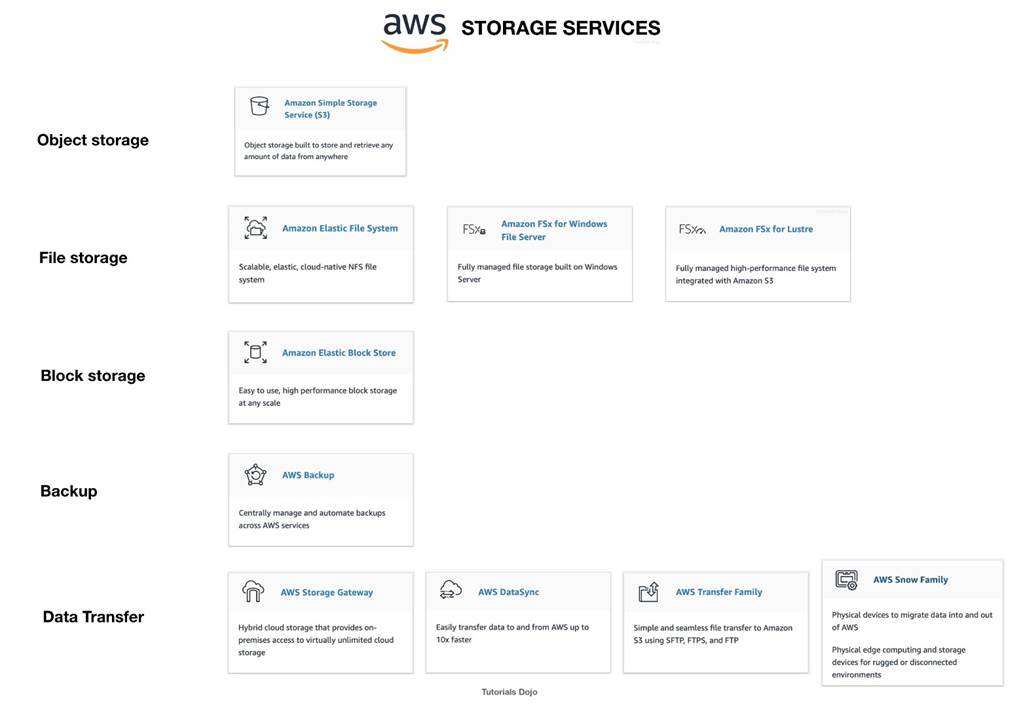Which of the following Amazon storage services should the developer use?
An AI-powered Forex trading application consumes thousands of data sets to train its machine learning model. The application’s workload requires a high-performance, parallel hot storage to process the training datasets concurrently. It also needs cost-effective cold storage to archive those datasets that yield low profit.
Which of the following Amazon storage services should the developer use?
A . Use Amazon FSx For Windows File Server and Amazon S3 for hot and cold storage respectively.
B . Use Amazon FSx For Lustre and Amazon S3 for hot and cold storage respectively.
C . Use Amazon FSx For Lustre and Amazon EBS Provisioned IOPS SSD (io1) volumes for hot and cold storage respectively.
D . Use Amazon Elastic File System and Amazon S3 for hot and cold storage respectively.
Answer: B
Explanation:
Hot storage refers to the storage that keeps frequently accessed data (hot data). Warm storage refers to the storage that keeps less frequently accessed data (warm data). Cold storage refers to the storage that keeps rarely accessed data (cold data). In terms of pricing, the colder the data, the cheaper it is to store, and the costlier it is to access when needed.

Amazon FSx For Lustre is a high-performance file system for fast processing of workloads. Lustre is a popular open-source parallel file system which stores data across multiple network file servers to maximize performance and reduce bottlenecks.
Amazon FSx for Windows File Server is a fully managed Microsoft Windows file system with full support for the SMB protocol, Windows NTFS, Microsoft Active Directory (AD) Integration.
Amazon Elastic File System is a fully-managed file storage service that makes it easy to set up and scale file storage in the Amazon Cloud.
Amazon S3 is an object storage service that offers industry-leading scalability, data availability, security, and performance. S3 offers different storage tiers for different use cases (frequently accessed data, infrequently accessed data, and rarely accessed data). The question has two requirements:
High-performance, parallel hot storage to process the training datasets concurrently. Cost-effective cold storage to keep the archived datasets that are accessed infrequently
In this case, we can use Amazon FSx For Lustre for the first requirement, as it provides a high-performance, parallel file system for hot data. On the second requirement, we can use Amazon S3 for storing cold data. Amazon S3 supports a cold storage system via Amazon S3 Glacier / Glacier Deep Archive.
Hence, the correct answer is: Use Amazon FSx For Lustre and Amazon S3 for hot and cold storage respectively.
Using Amazon FSx For Lustre and Amazon EBS Provisioned IOPS SSD (io1) volumes for hot and cold storage respectively is incorrect because the Provisioned IOPS SSD (io1) volumes are designed for storing hot data (data that are frequently accessed) used in I/O-intensive workloads. EBS has a storage option called "Cold HDD," but due to its price, it is not ideal for data archiving. EBS Cold HDD is much more expensive than Amazon S3 Glacier / Glacier Deep Archive and is often utilized in applications where sequential cold data is read less frequently.
Using Amazon Elastic File System and Amazon S3 for hot and cold storage respectively is incorrect. Although EFS supports concurrent access to data, it does not have the high-performance ability that is required for machine learning workloads.
Using Amazon FSx For Windows File Server and Amazon S3 for hot and cold storage respectively is
incorrect because Amazon FSx For Windows File Server does not have a parallel file system, unlike
Lustre.
References:
https://aws.amazon.com/fsx/
https://docs.aws.amazon.com/whitepapers/latest/cost-optimization-storage-optimization/aws-storage-ser
vices.html
https://aws.amazon.com/blogs/startups/picking-the-right-data-store-for-your-workload/
Check out this Amazon FSx Cheat Sheet:
https://tutorialsdojo.com/amazon-fsx/
Latest SAA-C03 Dumps Valid Version with 400 Q&As
Latest And Valid Q&A | Instant Download | Once Fail, Full Refund

